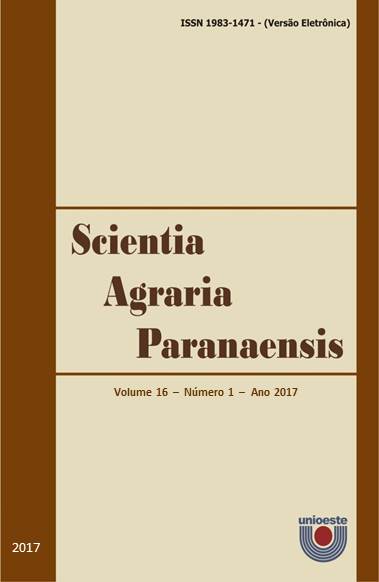Respiratory activity and quality of beet minimally processed
Agencias de apoyo
Palabras clave:
Beta vulgaris L., coloring, processing, metabolism.Resumen
Beet (Beta vulgaris L.) is a tuberous root of great agricultural importance and has been gaining value in the line of minimally processed products. The knowledge of the respiratory behavior and the postharvest quality of this vegetable, due to the processing to which it is submitted, has great importance to prolong its shelflife. The roots were stored for 7 days in a refrigerator at 5 ± 3 ºC and evaluated daily for respiratory rate, ethylene production, soluble solids content, titratable acidity, ascorbic acid content and betalein. All the evaluated characteristics presented influence of the time and the condition of storage, in beet with and withouth processing, on the respiratory pattern and the attributes of quality. In general, the storage of no processed beet guaranteed the best characteristics in all evaluated variables, and in the processed form, the cut in slices maintained the preservation of attributes related to quality, respiratory metabolism and betalinic pigments, being therefore recommended for the processing of this root.Descargas
Archivos adicionales
Publicado
05-04-2017
Cómo citar
SANCHES, A. G.; SILVA, M. B. da; MOREIRA, E. G. S.; COSTA, J. M.; CORDEIRO, C. A. M. Respiratory activity and quality of beet minimally processed. Scientia Agraria Paranaensis, [S. l.], v. 16, n. 1, p. 55–61, 2017. Disponível em: https://e-revista.unioeste.br/index.php/scientiaagraria/article/view/13562. Acesso em: 26 jul. 2025.
Número
Sección
Artigos Científicos
Licencia
Aviso de Direito Autoral Creative Commons
Política para Periódicos de Acesso Livre
Autores que publicam nesta revista concordam com os seguintes termos:
1. Autores mantém os direitos autorais e concedem à revista o direito de primeira publicação, com o trabalho simultaneamente licenciado sob a Licença Creative Commons Attribution que permite o compartilhamento do trabalho com reconhecimento da autoria e publicação inicial nesta revista.2. Autores têm autorização para assumir contratos adicionais separadamente, para distribuição não-exclusiva da versão do trabalho publicada nesta revista (ex.: publicar em repositório institucional ou como capítulo de livro), com reconhecimento de autoria e publicação inicial nesta revista.
3. Autores têm permissão e são estimulados a publicar e distribuir seu trabalho online (ex.: em repositórios institucionais ou na sua página pessoal) a qualquer ponto antes ou durante o processo editorial, já que isso pode gerar alterações produtivas, bem como aumentar o impacto e a citação do trabalho publicado (Veja O Efeito do Acesso Livre).
Licença Creative Commons
Esta obra está licenciada com uma Licença Creative Commons Atribuição-NãoComercial-CompartilhaIgual 4.0 Internacional, o que permite compartilhar, copiar, distribuir, exibir, reproduzir, a totalidade ou partes desde que não tenha objetivo comercial e sejam citados os autores e a fonte.


